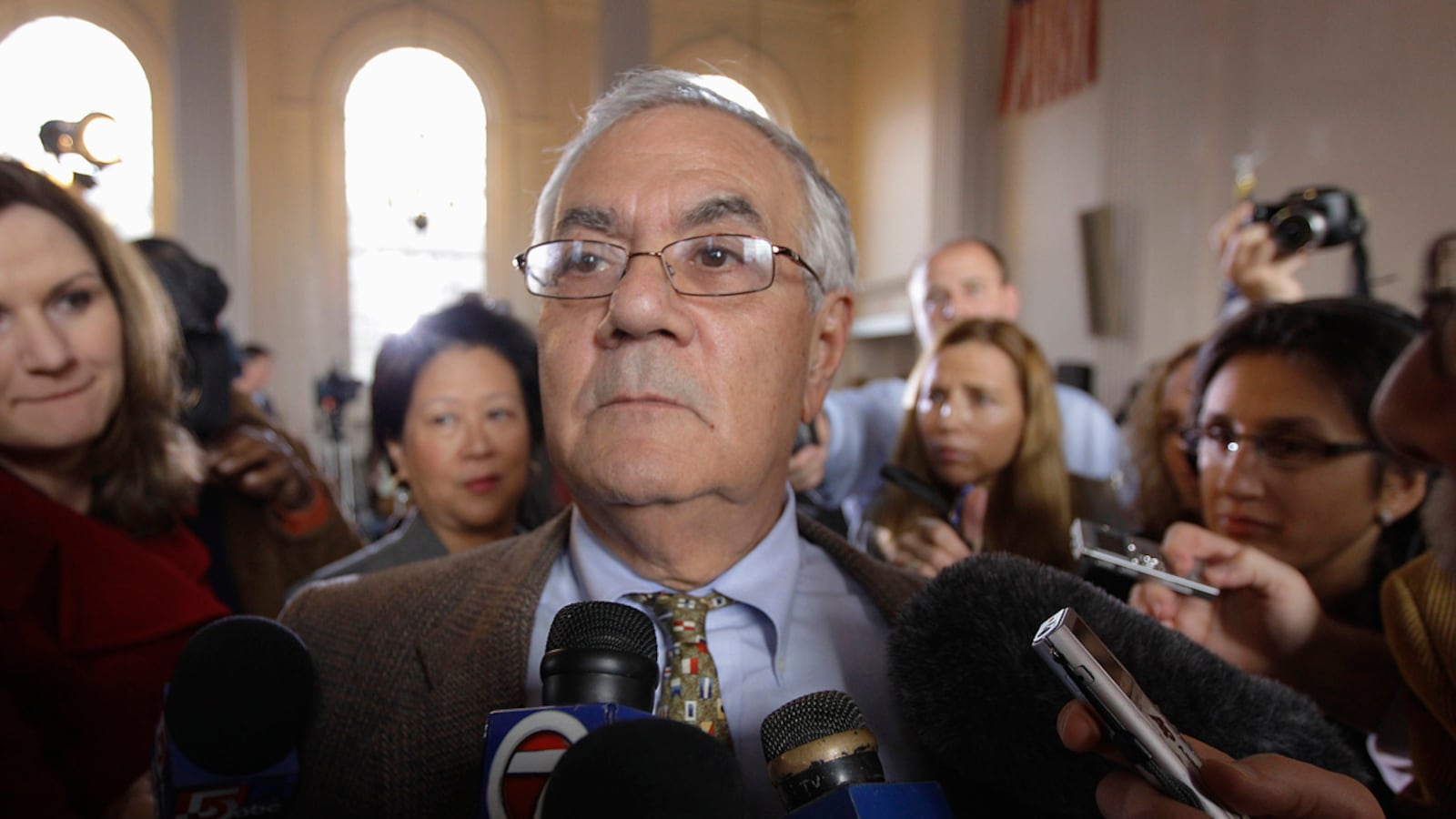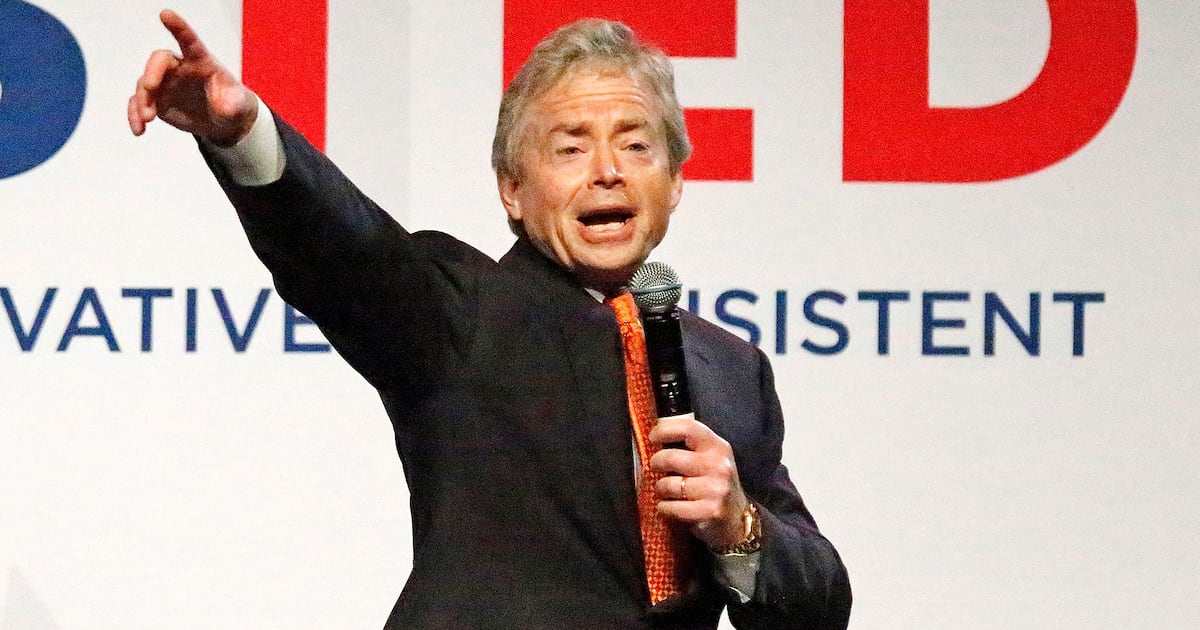A couple of years ago, I asked Barney Frank, then chairman of the House Financial Services Committee, what he’d do when he retired.
“I’d ignore people,” he told me, briskly. “I look forward to that.”
Fast-forward to Frank’s announcement Monday that he will not seek reelection in 2012. A comparably misanthropic sentiment was again on display. Explaining why he absolutely, positively will not become a lobbyist, the Massachusetts liberal noted that lobbyists are professional suck-ups and, for him, a major perk of leaving public office will be that “I don’t even have to pretend to try to be nice to the people I don’t like.”
This cracked up the crowd assembled at city hall in Newton, Mass., because, let’s face it, Frank has never wasted much energy on being nice to people he dislikes. Hell, much of the time he barely bothers being civil to those he does like. It is part of the prickly, impatient Dem’s charm. Part of what makes Barney Barney—along with his lightning wit, his unnerving intellect, his naked arrogance, and his lax approach to personal grooming.

The political world was caught off guard by Frank’s decision, if not wholly shocked. (He’s tired, those who’ve worked with him observe, and going from committee chairman to ranking minority member is a deflating experience.) While many Dems are throwing in the towel in these tough political times, the liberal icon occupies a reasonably safe seat in the deep-blue state of Massachusetts, Scott Brown notwithstanding. In 2010, he beat his Republican opponent by 10 points—a slimmer than usual margin in what had been a rougher than usual campaign for Frank, but not half bad considering the whupping that Dems suffered last cycle.
Thanks to redistricting, however, Frank was facing a much altered, more conservative electoral landscape this time around. The liberal enclave of New Bedford had been sliced out of his district, replaced by more Republican pockets. Wooing the 325,000 or so new-to-him voters, said Frank, would have required getting up to speed on new issues, knocking on new doors, and, worst of all, raising levels of cash much higher than he’d have needed simply to remind longtime constituents of how much he has done for them over the decades.
In short, Frank said, he’d need to be “engaged full-fledged in a campaign.” And that had about as much appeal for him as a colonoscopy.
Not that demographics were the only issue at play: “This decision was precipitated by congressional redistricting, not entirely caused by it,” insisted the congressman. Frank’s four years working on financial reform were, he reminded us, “busy and stressful.” More broadly, he said, legislating just ain’t what it used to be. “To my disappointment, the leverage you have within the government has substantially diminished,” he lamented. “The anger in the country, the currents of opinion are such so that the kind of inside work I have felt best at is not going to be as productive for the foreseeable future and not until we make some changes. And so I finally believe that my ability to be an advocate on the kinds of issues I most care about will be as great outside as inside.”
Maybe. But what will the disappearance of Frank do to the Congress itself?
Love him or loathe him, Frank is an original: a rare combination of street fighter, serious wonk, and old-school pragmatic institutionalist. He is a scrapper, yes, and viciously partisan when the occasion calls for it. (Remember his tirades during the Clinton impeachment?) But he is at heart a policy nerd, with an intellectual wattage unmatched among his colleagues. (Year after year, Frank has earned the title of brainiest member in all those insider surveys of Hill staffers.) “You had to bring your A game” when you went in to see Barney, says Scott Talbott, top lobbyist for the Financial Services Roundtable.
People also learn quickly to leave their bullshit at the door. Frank spurns the empty chitchat and flattery that make up so much of Washington conversation. And woe to the reporter, lobbyist, staffer, or even colleague who courts his wrath with a vapid comment or question he deems unworthy. When Frank says, “Are you really going to ask me that?” it’s clear what he’s really asking is, “Are you really that big a moron?”
To avoid such friction, lobbying groups carefully prep newcomers on the dos and don’ts of dealing with Barney, a process similar to what the congressman’s press office tries to do with first-time interviewers. As Frank’s sister, Democratic operative Ann Lewis, once said to me, “You’ll notice I do not start with patience as one of his virtues.”
Yet despite the gruff manner and partisan bluster, Frank is a deft and serious legislator. “At the end of the day he was an institutional guy,” says former Rep. Mike Oxley, Frank’s Republican predecessor as Financial Services Committee chairman. “He believed in the process. He believed in the Congress. He wasn’t really interested in scoring political points but in trying to get some things done.” With Frank as his ranking member, recalls Oxley, “there was a lot of bipartisan cooperation back then.”
Truth be told, Frank never should have made it this far. After blazing into the House in 1980 (he was named Best Freshman Member of his class), he hit the fast track for leadership. In 1987, he made history as the first member of Congress to voluntarily come out as gay, a move that many assumed would end his career. When he told Tip O’Neill, the legendary Democratic speaker responded: “I’m sorry to hear that … I thought you were going to be the first Jewish speaker.”
Confounding expectations, Frank didn’t just survive, he thrived, becoming a popular media figure. Then came the prostitution scandal. Forget your garden-variety tale of congressmen frequenting working girls. In the summer of 1989, an ex-boyfriend of Frank’s, Stephen Gobie, went public with the story of how he and Frank had met in 1985 through a sex ad, a first “date” that cost the congressman $80 and ultimately led to Gobie moving into Frank’s Capitol Hill apartment. There, Gobie set up a male prostitution ring, which he ran until Frank kicked him out in 1987. Gobie’s claims that Frank had given his blessing to the sex ring prompted a congressional investigation and turned Frank into a late-night punchline. The ethics committee ultimately ruled that Frank had not known of Gobie’s criminal pursuits, and the House opted for a simple reprimand. Even so, the episode would have ended the careers of most men. Not Frank. He apologized for his own stupidity and then, after something of a depressive funk, went to work fighting his way back.
The Republican Revolution of 1994 helped Frank get his groove back, as did the Lewinsky scandal. But it wasn’t until the financial meltdown at the end of George W. Bush’s term that Frank found himself back on top as a power player. As financial-services chairman—and, to be blunt, one of the few House members who understood the markets—Frank became the go-to guy for his party leadership and a key player in the administration’s efforts to stop the bleeding. Hammering out the details of the subsequent reform bill took both his intellectual and political chops. In return, he (again) became a favorite Republican bogeyman—this time for fiscal rather than family-values reasons—with presidential contender Newt Gingrich recently going so far as to suggest that he should be tossed in jail.
Now, with congressional Republicans pushing to weaken the Dodd-Frank reforms, the Massachusetts congressman says he wants to spend about half his time in this last term resisting such a rollback. The other half he will commit to making sure Republicans don’t try to reduce the deficit solely by slashing entitlements and other domestic spending.
Along the way, however, he clearly intends to have a little fun at Republicans’ expense. During the Newton event, Frank took multiple swipes at Gingrich, including issuing his own vow to become “neither a lobbyist nor a historian”—a wicked swipe at Gingrich’s recent insistence that he never lobbied on behalf of Freddie Mac, but was instead paid $1.6 million over seven years to provide his services as “a historian.”
Indeed, throughout the 40-minute presser, Frank seemed almost jolly. His face had a bit of a glow, his hair was combed, he smiled and cracked jokes and teased reporters with relative gentleness. After a question about whether he would be giving up his residence in Washington after all these years (he will), Frank bid everyone a pleasant farewell and waddled slowly away from the lectern.
As he was swallowed up by the waiting mob of cameras and microphones, it was hard not to feel sentimental pang. Without Barney, the House will be a vastly duller place. In every sense of the word.






